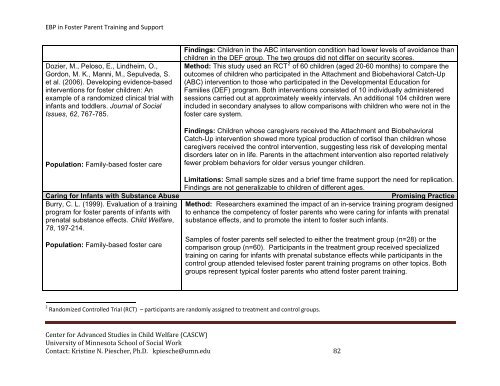Evidence-Based Practice in Foster Parent Training and Support ...
Evidence-Based Practice in Foster Parent Training and Support ...
Evidence-Based Practice in Foster Parent Training and Support ...
Create successful ePaper yourself
Turn your PDF publications into a flip-book with our unique Google optimized e-Paper software.
EBP <strong>in</strong> <strong>Foster</strong> <strong>Parent</strong> Tra<strong>in</strong><strong>in</strong>g <strong>and</strong> <strong>Support</strong>Dozier, M., Peloso, E., L<strong>in</strong>dheim, O.,Gordon, M. K., Manni, M., Sepulveda, S.et al. (2006). Develop<strong>in</strong>g evidence-based<strong>in</strong>terventions for foster children: Anexample of a r<strong>and</strong>omized cl<strong>in</strong>ical trial with<strong>in</strong>fants <strong>and</strong> toddlers. Journal of SocialIssues, 62, 767-785.Population: Family-based foster careF<strong>in</strong>d<strong>in</strong>gs: Children <strong>in</strong> the ABC <strong>in</strong>tervention condition had lower levels of avoidance thanchildren <strong>in</strong> the DEF group. The two groups did not differ on security scores.Method: This study used an RCT 2 of 60 children (aged 20-60 months) to compare theoutcomes of children who participated <strong>in</strong> the Attachment <strong>and</strong> Biobehavioral Catch-Up(ABC) <strong>in</strong>tervention to those who participated <strong>in</strong> the Developmental Education forFamilies (DEF) program. Both <strong>in</strong>terventions consisted of 10 <strong>in</strong>dividually adm<strong>in</strong>isteredsessions carried out at approximately weekly <strong>in</strong>tervals. An additional 104 children were<strong>in</strong>cluded <strong>in</strong> secondary analyses to allow comparisons with children who were not <strong>in</strong> thefoster care system.F<strong>in</strong>d<strong>in</strong>gs: Children whose caregivers received the Attachment <strong>and</strong> BiobehavioralCatch-Up <strong>in</strong>tervention showed more typical production of cortisol than children whosecaregivers received the control <strong>in</strong>tervention, suggest<strong>in</strong>g less risk of develop<strong>in</strong>g mentaldisorders later on <strong>in</strong> life. <strong>Parent</strong>s <strong>in</strong> the attachment <strong>in</strong>tervention also reported relativelyfewer problem behaviors for older versus younger children.Limitations: Small sample sizes <strong>and</strong> a brief time frame support the need for replication.F<strong>in</strong>d<strong>in</strong>gs are not generalizable to children of different ages.Car<strong>in</strong>g for Infants with Substance Abuse Promis<strong>in</strong>g <strong>Practice</strong>Burry, C. L. (1999). Evaluation of a tra<strong>in</strong><strong>in</strong>gprogram for foster parents of <strong>in</strong>fants withprenatal substance effects. Child Welfare,78, 197-214.Population: Family-based foster careMethod: Researchers exam<strong>in</strong>ed the impact of an <strong>in</strong>-service tra<strong>in</strong><strong>in</strong>g program designedto enhance the competency of foster parents who were car<strong>in</strong>g for <strong>in</strong>fants with prenatalsubstance effects, <strong>and</strong> to promote the <strong>in</strong>tent to foster such <strong>in</strong>fants.Samples of foster parents self selected to either the treatment group (n=28) or thecomparison group (n=60). Participants <strong>in</strong> the treatment group received specializedtra<strong>in</strong><strong>in</strong>g on car<strong>in</strong>g for <strong>in</strong>fants with prenatal substance effects while participants <strong>in</strong> thecontrol group attended televised foster parent tra<strong>in</strong><strong>in</strong>g programs on other topics. Bothgroups represent typical foster parents who attend foster parent tra<strong>in</strong><strong>in</strong>g.2 R<strong>and</strong>omized Controlled Trial (RCT) – participants are r<strong>and</strong>omly assigned to treatment <strong>and</strong> control groups.Center for Advanced Studies <strong>in</strong> Child Welfare (CASCW)University of M<strong>in</strong>nesota School of Social WorkContact: Krist<strong>in</strong>e N. Piescher, Ph.D. kpiesche@umn.edu 82
















